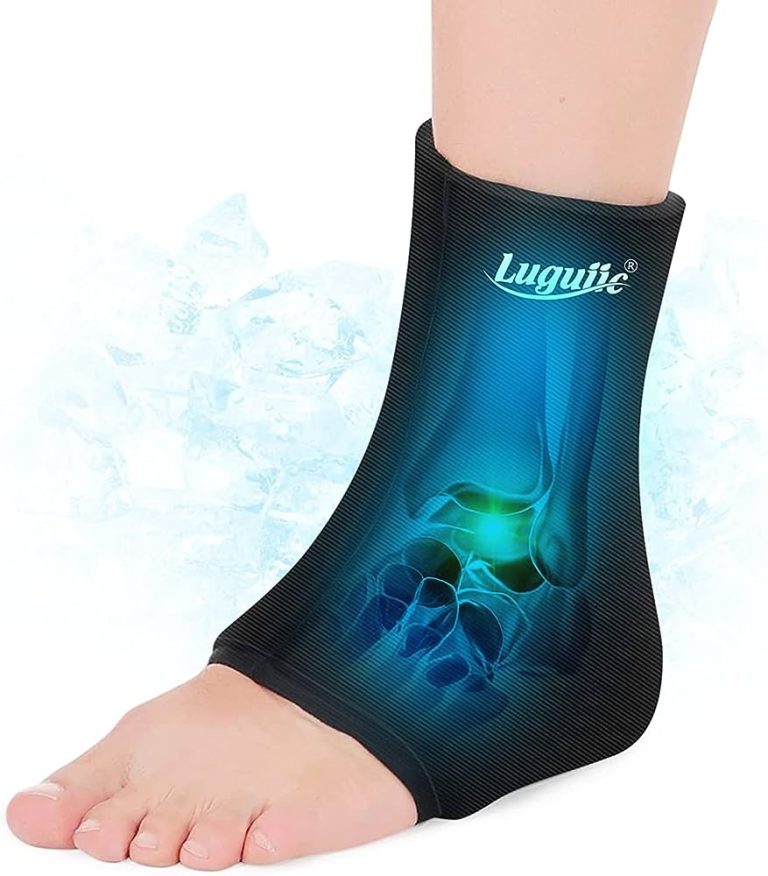
It is not necessary to wrap your foot if you have gout as wrapping can potentially worsen the symptoms. Gout is a form of arthritis characterized by severe pain, swelling, and inflammation, typically affecting the big toe.
While wrapping the foot might seem like a logical solution to alleviate the discomfort, it can restrict blood flow and cause more discomfort in the long run. Instead, it is crucial to seek appropriate medical treatment for gout, such as medications, lifestyle changes, and managing triggers like diet and alcohol consumption.
Consulting with a healthcare professional is advised to develop a personalized treatment plan tailored to your specific needs.
|
Serial |
Relevant Topic |
|
1 |
How is Walking for Gout? |
|
2 |
Should I Wear Socks With Gout? |
|
3 |
How to Walk With Gout? |
|
4 |
Can Tight Shoes Create Gout? |
Should I Wrap My Foot: Gout Solution?
Gout is a form of arthritis characterized by sudden, intense pain, swelling, and stiffness in the joints. It commonly affects the foot, particularly the big toe. The condition occurs when there is a buildup of uric acid in the bloodstream, leading to the formation of urate crystals in the joints. These crystals cause inflammation and severe pain.

Causes of gout can include a combination of genetic factors, lifestyle choices, and certain medical conditions. Diets high in purines, excessive alcohol consumption, obesity, and certain medications can all contribute to the development of gout. Symptoms of gout typically manifest as sudden attacks of pain, redness, swelling, and tenderness in the affected joint, with the big toe being a commonly affected site.
When gout affects the foot, it can significantly impact mobility and daily activities. Movement becomes painful, and walking may be challenging. The foot may become swollen, tender, and warm to the touch. It is important to manage gout effectively to prevent or minimize its impact on foot health and overall well-being.
Wrapping The Foot: A Debatable Practice
Wrapping the Foot: A Debatable Practice
Gout is a painful form of arthritis that commonly affects the foot, leading many individuals to explore various treatment options. One such practice is foot wrapping, which has sparked debates among medical professionals. The effectiveness of foot wrapping for gout remains a topic of discussion, with both proponents and skeptics offering their arguments.
Arguments for foot wrapping:
- Offers support and stability to the affected foot
- May help reduce swelling and inflammation
- Provides pain relief by immobilizing the joint
Arguments against foot wrapping:
- May restrict blood flow and exacerbate swelling
- Can cause discomfort and hinder mobility
- Does not address the underlying cause of gout
While foot wrapping is a debated practice, individuals should also consider alternative treatments for gout. These may include:
| Treatment Option | Advantages | Disadvantages |
|---|---|---|
| Medication | Effective in controlling inflammation | Possible side effects |
| Dietary Changes | May prevent gout flare-ups | Requires long-term commitment |
| Physical Therapy | Improves joint flexibility and strength | Requires regular sessions |
The Surprising Answer: Should You Wrap Your Foot?
Wrapping your foot when you have gout is a topic that has drawn attention in recent research. Studies have shown varying findings on whether foot wrapping is beneficial for gout patients or not. Before deciding to wrap your foot, it’s important to consider different factors such as the severity of your gout, any other underlying medical conditions, and the advice of medical professionals.
Research findings on foot wrapping for gout have been inconclusive. Some studies indicate that wrap compression may help reduce foot pain and swelling, while others suggest it may hinder blood circulation and exacerbate symptoms. It’s essential to be cautious and consult with a healthcare provider to determine if foot wrapping is suitable for you.
Professional opinions on foot wrapping for gout also differ. Some experts recommend using compression wraps to manage symptoms, while others advise against it due to potential risks. It is best to talk to your doctor or a podiatrist who specializes in gout treatment for personalized advice based on your specific condition.
Managing Gout Symptoms: Tips And Strategies
Gout is a painful condition caused by the buildup of uric acid crystals in the joints. Managing gout symptoms requires a combination of lifestyle modifications and medication. Lifestyle modifications play a crucial role in minimizing gout flares and reducing pain. Some important lifestyle changes include:
- Following a gout-friendly diet, low in purines and high in fruits, vegetables, and whole grains.
- Drinking plenty of water to stay hydrated and help flush out uric acid.
- Avoiding alcohol, particularly beer, as it can trigger gout attacks.
- Maintaining a healthy weight, as obesity is a risk factor for gout.
- Engaging in regular exercise to help control weight, improve joint function, and reduce inflammation.
Medications can also be prescribed to manage gout pain and prevent future attacks. These medications may include:
- Nonsteroidal anti-inflammatory drugs (NSAIDs) to relieve pain and inflammation.
- Colchicine, which reduces inflammation and can be taken during gout attacks.
- Xanthine oxidase inhibitors, such as allopurinol or febuxostat, which lower uric acid levels in the blood.
- Corticosteroids, such as prednisone, for severe gout attacks or when other medications cannot be used.
In addition to lifestyle modifications and medications, there are other pain management techniques that can provide relief for gout symptoms. These techniques include:
- Applying ice packs to the affected joints to reduce inflammation and numb the area.
- Elevating the affected foot to help reduce swelling.
- Using supportive footwear or braces, may be wear socks with gout to protect and stabilize the affected joint.
- Engaging in relaxation techniques, such as deep breathing or meditation, to manage stress and pain.
Holistic Approaches: Natural Remedies For Gout
Should I Wrap My Foot If I Have Gout
Gout is a type of arthritis that typically affects the big toe, causing intense pain and inflammation. While wrapping your foot may not directly treat gout, there are holistic approaches and natural remedies that can help alleviate gout symptoms.
Natural remedies to alleviate gout symptoms:
- Cherry juice: Drinking cherry juice or consuming cherries can help reduce gout attacks due to their anti-inflammatory properties.
- Apple cider vinegar: Incorporating apple cider vinegar into your diet may help alkalize the body, reducing the likelihood of gout flare-ups.
- Turmeric: This spice contains curcumin, known for its anti-inflammatory effects. Adding turmeric to your meals may help reduce gout-related inflammation.
Dietary changes for gout prevention:
- Limit purine-rich foods: Consuming foods high in purines, such as red meat and seafood, can contribute to gout attacks. Reducing their intake may help minimize symptoms.
- Increase water intake: Staying well-hydrated helps flush excess uric acid out of the body, reducing the risk of gout flare-ups.
- Choose low-fat dairy products: Studies suggest that low-fat dairy products may help lower uric acid levels, therefore reducing the risk of gout.
Maintaining overall foot health and care:
- Wear comfortable shoes: Wearing proper comfortable footwear can relieve pressure on your joints and reduce the risk of gout-related foot pain.
- Keep feet clean and dry: Proper hygiene and regular washing can prevent infections and complications in gout-affected feet.
- Exercise regularly: Engaging in low-impact exercises, such as swimming or cycling, can help improve overall foot health and reduce gout symptoms.

Credit: us.macmillan.com
User’s Queries for Should I Wrap My Foot If I Have Gout
Is Compression Wrap Good For Gout?
Compression wrap can be beneficial for gout. It helps reduce swelling, provides support, and improves circulation in the affected area. Using a compression wrap can alleviate pain and discomfort caused by gout, allowing for better mobility and faster recovery.
What Stops Gout Pain Immediately?
To immediately relieve gout pain, apply ice packs, elevate the affected joint, and take over-the-counter anti-inflammatory drugs like ibuprofen. Drinking plenty of water and avoiding foods high in purines, such as red meat and seafood, can also help alleviate symptoms.
Does Walking On A Foot With Gout Make It Worse?
Walking on a foot with gout can worsen the condition. It increases pain, inflammation, and potential damage to joints. Proper rest and elevation help alleviate symptoms and promote healing.
What Not To Do During A Gout Flare Up?
During a gout flare up, avoid these actions:
1. Consuming high-purine foods like organ meats and seafood.
2. Drinking alcohol, especially beer.
3. Eating foods high in fructose, such as sugary drinks and snacks.
4. Staying sedentary, it’s important to stay active.
5. Forgetting to take medication prescribed by your doctor for gout.
Conclusion: Should I Wrap Foot If I Have Gout
Wrapping your foot if you have gout can provide some relief by immobilizing the joint and reducing inflammation. However, it is important to consult with a healthcare professional for proper diagnosis and treatment guidance. They can assess your condition, recommend appropriate interventions such as medications, lifestyle changes, or physical therapy.
Remember, taking a comprehensive approach to managing gout is crucial to alleviate symptoms and prevent future flare-ups.
